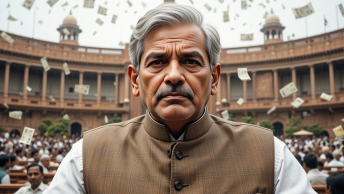The second panel at the recently concluded PRS Conference examined “Parameters for Measuring the Effectiveness of Legislative Bodies”. Having worked on the discussion paper for this conference alongwith the one on reform of campaign finance laws, I can testify to the paucity of literature available on this subject. As can be seen from the discussion paper available at this link, the Commonwealth Parliamentary Association has recommended benchmarks for democratic legislatures setting standards for the institutional and procedural structures of legislatures. The World Bank Institute has published a study on legislative oversight and budgeting that includes metrics to assess the effectiveness of legislatures. For example, they list oversight tools such as committee hearings and questions, and measure the number of times these have been used.
However, none of these reports provide a comprehensive set of criteria for measuring effectiveness of legislative bodies and therefore, we had to come up with a set of criteria, largely on our own, for measuring effectiveness of legislatures. The metrics we devised were based on an assumption that the four main functions of the Indian Parliament are: legislation, executive oversight, representation and budgeting. Some criteria for evaluating Parliament’s effectiveness as a legislative body include the quantity and quality of laws enacted. Obviously, judging the quality of law is more difficult than assessing the quantity of legislation enacted. For instance, we can evaluate the quantity of time devoted to law making by computing the total amount of time spent by MPs on debating bills in Parliament, the percentage of time spent on legislative business in Parliament as opposed to other things (including pointless shouting matches and unnecessary disruptions/adjournments) as well as the average amount of time spent in discussing pending bills. The data provided in the PRS discussion paper reveals that the current Parliament has spent only 20% of its time on legislation each year during the last five years. The quality of legislation can be judged by the quality of speeches made during legislative debates and the quality of the law enacted. Some suggested metrics for evaluating the quality of enacted laws are to examine the percentage of enacted laws struck down by courts on grounds of constitutional invalidity and the percentage of laws amended subsequently shortly after their enactment. These metrics are based on the assumption that a law that needs to be amended shortly after it is enacted or that has been declared unconstitutional by the High Court or Supreme Court cannot have been very well thought of at the time of enactment, therefore reflecting poor quality of legislation. Of course, these are not the only criteria for judging the quality of legislation and it would be useful to hear feedback on the metrics described in the discussion paper.
The panelists at the conference included Dr. Bimal Jalan, erstwhile governor of the Reserve Bank of India and a nominated member of the Rajya Sabha, Mr. Arun Shourie, former journalist and BJP member of the Rajya Sabha and Mr. Nandan Nilekani, co-chairman, Infosys Technologies Limited. The panel was moderated by Mr. Siddharth Varadarajan, an editor with the Hindu.
Dr. Bimal Jalan started by saying that as a nominated member of Parliament, he offered an outsider’s perspective of parliamentary proceedings and functioning. He gave a positive nod to the work of the parliamentary standing committees as the only place in Parliament where work is done in a non partisan manner. That was perhaps the only positive thing he had to say about the Indian Parliament as an institution. On as he described it, “a more realistic note”, he found Parliament as an institution to be absolutely ineffective because “nothing gets done”. He dismissed the myth of collective responsibility of the executive to parliament stating that if Parliament cannot even decide when it will meet or for how long it will meet, then there was no such responsibility. Parliament is convened merely for carrying out government business or for confidence motions. Legislative debates are impeded by political and other agenda, while MPs have no independent thinking or voting on issues as they are forced to toe the party line due to the anti defection provisions contained in the 10th Schedule of the Constitution. He concluded by stating that the question for an independent observer is not to measure the “effectiveness” but the “ineffectiveness” of Parliament. The legislature and legislators are not free to do anything in the interest of the country. There is no accountability whatsoever and the legislatures are marked by the supremacy of political parties.
Mr. Arun Shourie started his remarks by lauding the efforts of PRS in raising the level of MPs’ awareness of issues in legislation. He raised the following issues requiring consideration in judging the effectiveness of Parliament and provided his thoughts on the same.
1. Whether Parliament is an effective forum on national issues and policies? Whether the executive is responsible to Parliament? Agreeing with Dr. Jalan’s description of Parliament as an ineffective institution, he reiterated that it is a complete myth that the executive is responsible to Parliament. There is no illusion left about this reality now after the cash for vote scam. 2. Whether Members speak and vote their mind regarding national issues? Does the Parliament support discussion? Mr. Shourie reiterated the points regarding adversarial politics and the incidence of blame games rather than concrete discussion on any legislative proposal in Parliament. He stressed the need to amend the 10th Schedule in order to facilitate independent thinking and voting on bills irrespective of party lines.3. Are members representatives of the people? What kind of representation are we talking about? In terms of representation, Mr. Shourie argued that because of the first past the poll rule, it turns out that our elected representatives actually do not represent a majority of the population. Therefore, he recommended that India adopt a two round voting or as it is commonly also called “runoff voting” procedure. Under runoff voting, the voter simply casts a single vote for their favorite candidate. However, if no candidate receives an absolute majority of votes, then all candidates, except the two with the most votes, are eliminated, and a second round of voting occurs.
4. The media needs to be more responsible: In a harsh indictment of the media, he stated that the media also tends to focus only on the nonsense and shouting matches that go on in Parliament in order to sensationalise news instead of covering parliamentary debates in the manner that they should be covered. The media should focus on the content of Parliament and MPs without being biased and content specific.
5 . Decriminalisation of politics and legislatures: Mr. Shourie stated that we have to ensure both decriminalisation of politics and also that those who have criminal records do not serve as MPs. He called for amendment of section 8A of the Representation of the People Act, 1951, which allows an MP who has been convicted of a crime, to continue in Parliament so long as he appeals against the conviction within 30 days. Given the delays in our judicial system, this basically translates into convicted MPs, including those convicted of heinous offences, continuing as MPs for the duration of their parliamentary tenure.
6. There has to be detailed analysis of legislative policy and bills like that conducted by PRS. On this note, he stated that if our politicians will not undertake their responsibilities, it would fall to independent bodies like PRS to do the work.
The last speaker, Mr. Nandan Nilekani commenced his remarks by breaking down the idea of the “effectiveness” of legislatures to mean both “efficiency effectiveness” and “equity effectiveness”. While the “efficiency effectiveness” criterion is easy to measure but the same cannot be said of the “equity effectiveness” criterion. The latter also includes measurement of the effectiveness of Parliament as a body as well as the effectiveness of individual parliamentarians. In this context, he stated that the anti defection law has had unintended consequences. Since MPs have to follow the party whip or face disqualification, they have no incentive to study the issue on which debate occurs or to speak their mind and present their personal views. But unless there is healthy legislative debate, we cannot have reform. Therefore, the need of the hour is to repeal the anti defection law.
Mr. Nilekani reiterated the concerns expressed by Dr. Jalan and Mr. Shourie regarding the executive’s role in circumscribing the functions of Parliament to the extent that the executive determines when a parliamentary session will be held or not. He posed the question as to whether there was a way that the Parliament could come together without executive approval but that the appropriate place for this debate is Parliament. He also reiterated praise for the Parliamentary Standing committees stating that his interaction with them had been very different from his interaction with Parliamentarians in general. He had a mixed view about whether the proceedings of the committees should be made transparent or not because he feared that transparency of proceedings may result in grandstanding along party lines.
In a striking contrast from Dr. Jalan’s sombre forecast about the future of Parliament as an institution, Mr. Nilekani was optimistic stating that things will change over time, particularly since in the next 25 years, there will be a billion Indians below the age of 20 and the ever growing middle class will be a force to reckon with. It is striking that the person most optimistic about the possibility of more effective legislatures is not a legislator.
In rounding off the discussion, Mr. Varadarajan noted that all three panelists recommended repeal of the anti defection law but considered the feasibility of political consensus on this issue debatable. The panelists also agreed that there was a need to incentivise change. We need to understand what attracts particular types of people to become MPs and see if we can’t change the incentives to attract talented people to the job. Another way of reforming MP behaviour is for visible/privileged classes to seek greater accountability from their elected representatives. The lesson to leave with in this apparently hopeless set of affairs is Mr. Shourie’s advice to “keep up the outrage; keep revamping one institution or one aspect of an institution bit by bit to make a difference”, however insubstantial, and hopefully reform will occur.






